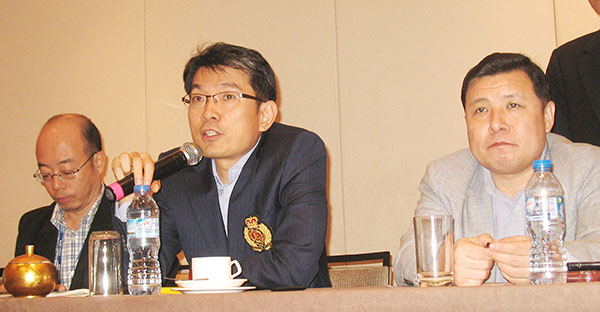Yarn, garments expected to push E-land Thanh Cong ahead

The Ho Chi Minh City-based company, which often goes under its original Thanh Cong Textile and Garment name, is eyeing 2014 sales and net profits of $131 million and $7.6 million, respectively, compared with $120 million and $5.5 million for 2013, said its CEO Lee Eun Hong.
During the company’s investors meeting late December, he said the 2014 sales target included up to $63 million from garment sales, $53 million from yarn, and $11 million from fabrics.
The TPP is a proposed trade agreement under negotiation by Australia, Brunei, Chile, Canada, Japan, Malaysia, Mexico, New Zealand, Peru, Singapore, the US and Vietnam. It would offer high hopes on the proposed yarn-forward rule, which would allow Vietnam to buy Chinese fabrics, transform them into garments and ship them stateside duty-free.
E-land Thanh Cong, currently a bluechip on the Ho Chi Minh Stock Exchange, would pay a cash dividend of 10-15 per cent for 2013 depending on shareholders’ decision, said Lee.
E-land, with its business cores being fashion, retail and hospitality, is E-land Thanh Cong’s biggest shareholders with a 45 per cent stake. Other foreign investors hold another four per cent, putting foreign ownership in Thanh Cong at a maximum 49 per cent as ruled by the Vietnamese government. Lee said the Korean firm would invest more if Vietnam raises the cap, and was also looking around for acquisitions in the retail and textile business.
E-land’s investment into Thanh Cong in 2009 put it in the list of top deals of the 2010 M&A Vietnam Forum organised by VIR. E-land orders currently account for 35 per cent of the garments by Thanh Cong, and are shipped to China and Korea.
Thanh Cong’s chief strategy officer Tran Nhu Tung said the company plans to build a $30 million factory with 3,500 workers altogether in Hoa Phu Industrial Park situated in the Mekong Delta province of Vinh Long, as its facilities in Ho Chi Minh City were already operating at full capacity. The first stage is set to start production by 2015 for garments, followed by stage two for knitting by 2016 and stage three for non-polluted dyeing by 2017. The company is currently considering bank loans and raising capital from shareholders for the project.
Tung added his firm expected its sales and profits to increase by 25 per cent annually since 2014.
What the stars mean:
★ Poor ★ ★ Promising ★★★ Good ★★★★ Very good ★★★★★ Exceptional
Latest News
More News
- Pegasus Tech Ventures steps up Vietnam focus (February 05, 2026 | 17:25)
- The generics industry: unlocking new growth drivers (February 04, 2026 | 17:39)
- Vietnam ready to increase purchases of US goods (February 04, 2026 | 15:55)
- Steel industry faces challenges in 2026 (February 03, 2026 | 17:20)
- State corporations poised to drive 2026 growth (February 03, 2026 | 13:58)
- Why high-tech talent will define Vietnam’s growth (February 02, 2026 | 10:47)
- FMCG resilience amid varying storms (February 02, 2026 | 10:00)
- Customs reforms strengthen business confidence, support trade growth (February 01, 2026 | 08:20)
- Vietnam and US to launch sixth trade negotiation round (January 30, 2026 | 15:19)
- Digital publishing emerges as key growth driver in Vietnam (January 30, 2026 | 10:59)















 Mobile Version
Mobile Version